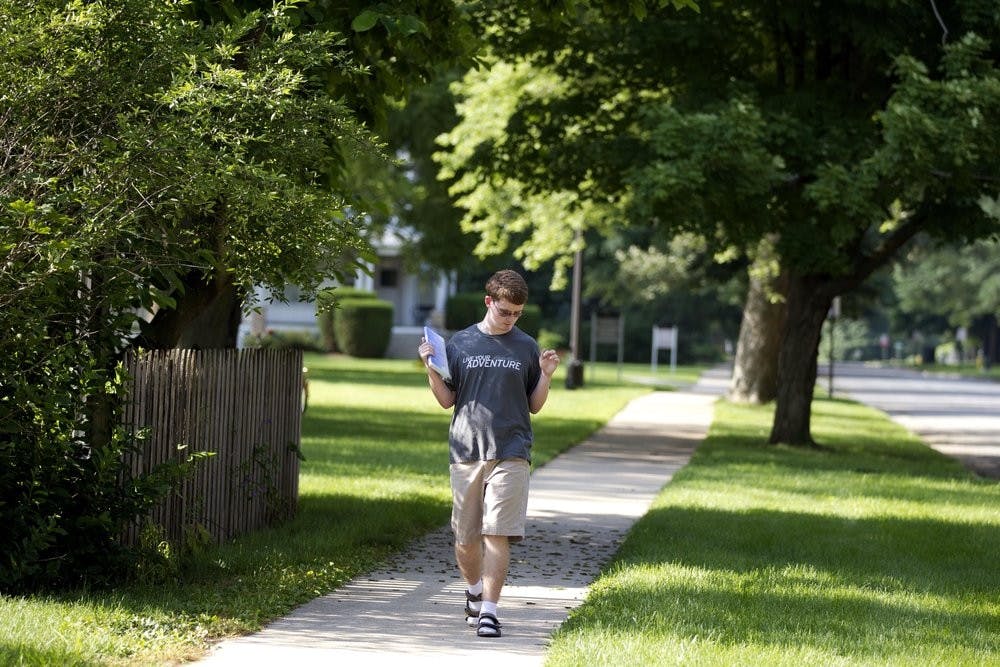ASU’s School for the Future of Innovation in Society on Oct. 3 held a screening of “Deej,” a documentary about a nonspeaking autistic man and his desire for inclusion and rights.
The screening was held in the Marston Exploration Theater on the Tempe campus as part of a national “Deej Inclusion Tour.” The tour is a nationwide series of campus and community screenings, like the one that came to ASU.
The film, directed by Robert Rooy, follows the life of DJ “Deej” Savarese as he completes high school and explores filmmaking and poetry as a means of expression. Savarese is an advocate for disability rights and fights for awareness and inclusion for nonspeaking autistic people like himself.
Rebecca Monteleone, a graduate student in the School for the Future Innovation in Society, said the film is unique because of the insider’s perspective it offers regarding autism and nonspeaking autistic people.
“What is so fantastic about this film is that (Savarese) is one of the producers on it, so he is not only the focus of the film, he also has artistic control over the film ... It’s a really different look at neurodiversity,” Monteleone said. “It’s not being told through his parents' point of view, it's not being told through an autism expert's point of view. It's being told through his point of view.”
Monteleone also emphasized the important message about inclusion the film offers and the relationship of this message to the ASU community.
"(Savarese) recognizes that he has quite a privileged life. He’s got a lot of support around him, he’s got funds to pay for the kinds of technology that he needs," she said. "What he recognizes is that other people don't have those things, and inclusion shouldn't be something that only privileged people get. It should be something that everybody has access to.
“There are people with autism on college campuses and that’s something we forget about …" she said. "They are a part of our community and deserve to be spoken about in a way that is respectful, in a way that is dignified, in a way that is educated."
Computer science freshman Isabella Shilliday said before the screening that the film will help students like herself become more aware of the challenges and triumphs of their autistic peers.
“(Students) can get caught up in our own struggles, and we can be ignorant and not really think about others," she said. "('Deej') makes me think about what other people have to go through."
She said she believes awareness about autism can lead to inclusion and opportunities for autistic people on college campuses.
"Just because somebody is disabled doesn’t mean that they shouldn’t have the same opportunities that I have," Shilliday said. "They deserve the same opportunities to grow, expand their minds and get a proper education.”
Informatics seniorJenna Breunig, the public information officer of ASU’s Autistics on Campus club, is autistic and recognizes the need for representation of disability in media.
“Most autism movies are pretty much terrible. They feature white male "autism bots" that have been programmed with the DSM-5 criteria, and the story is about how strange and unlikable they are, and how hard life is for their parents,” Breunig said in an email interview Monday.
"(‘Deej’ is) an earnest, heartfelt documentary about an autistic nonspeaking young man struggling to find inclusion in an inherently discriminatory world," she said in the email. "I saw a thoughtful and deeply emotional young man who moves the same way that I do. He acts like me. He feels like me in a way that transcends words.”
Breunig also emphasized the impact that films like “Deej” can have on college campuses and hopes that this screening is the start of a positive trend.
“It is so hard to find representations of autism that are actually good, and it's heartening to see one being shown here,” she said. “‘Deej’ values Deej's voice. It's heartening to see this being screened. I hope it is a sign of more to come.”
Reach the reporter at mcmcint1@asu.edu or follow @maevemcintyree on Twitter.
Like The State Press on Facebook and follow @statepress on Twitter.




